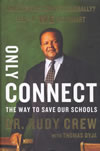The Harvard Family Research Project separated from the Harvard Graduate School of Education to become the Global Family Research Project as of January 1, 2017. It is no longer affiliated with Harvard University.
Volume XIV, Number 1 & 2, Spring 2008
Issue Topic: Building the Future of Family Involvement
Book Review
Only Connect: The Way to Save Our Schools
 Helen Westmoreland of HFRP reviews Only Connect: The Way to Save Our Schools by Rudy Crew. An interview with Dr. Crew can be found on pages 20–21 of this issue.
Helen Westmoreland of HFRP reviews Only Connect: The Way to Save Our Schools by Rudy Crew. An interview with Dr. Crew can be found on pages 20–21 of this issue.
“One teacher up at the front of the room with a pointer can’t make all the connections that a twenty-first century education requires. But we all carry the light of our particular knowledge, and Connected Schools ask each of us to focus that light on the place called school so our children can see the world around them with the clarity and courage they’ll need.”1
In Only Connect: The Way to Save Our Schools, Dr. Rudy Crew, superintendent of the Miami-Dade County Public Schools, articulates a powerful vision for public education built on the premise that schools must look past their real and imagined walls and connect with the world around them. Young people, he argues, need to be able to connect their learning to the real world to be productive citizens; educators need to connect to their students to teach and inspire them; and schools need to connect to families and communities to both leverage other resources and to build accountability. Only Connect describes a need for a shared responsibility for education and makes a plea for all stakeholders to demonstrate a commitment to educating our nation’s young people.
At the core of Crew’s vision are “Connected Schools”—schools that are “connected in the intimate, functional way the heart works within our bodies” to families, businesses, community institutions, and others outside the school.2 Though the book also addresses such topics as standards, assessment, and the role of the federal government in ensuring students receive a quality education, this review hones in on how Only Connect proposes that schools redefine their relationship with families and the community through Connected Schools.
Forging Connections With Families
At the heart of Connected Schools is the twofold belief that (a) families are critical to the work of educating young people and (b) schools must take the first step toward helping families realize their potential. “I don’t care where it’s located, how poor its families are,” Crew writes. “If you can get a critical mass of engaged, thoughtful, and knowledgeable parents to participate on a consistent basis, that school will be successful.” He argues that schools should not only welcome but also foster the development of what he coins “Demand Parents.” As opposed to “Supply Parents”—passive recipients of education—Demand Parents “demand things from their schools because they understand that they are indeed owed something and it is their responsibility to get it for their children.”3
Not only do Demand Parents hold their schools accountable, but they also share in the responsibility of helping their children learn. Not all parents know that there is a role for them in education, and, Crew argues, it is the responsibility of the school system to help them realize this role. Connected Schools are founded on the belief that all children can learn and all parents can teach.
In Miami-Dade County, Crew is working to build a cadre of Demand Parents through an initiative called the Parent Academy. Intended to help parents “cross the bridge” from home to school, this initiative offers classes on early childhood, health and wellness, helping children learn, financial skills, languages, parenting skills, personal growth, and technology at locations throughout the community. Designed by asking parents what they wanted and needed, both for themselves and for their children, the Parent Academy served over 28,000 parents in its first 2 years.
The Heart of Their Community
Only Connect also emphasizes the role of the community, including businesses and higher education. Crew argues for “mutuality of service delivery” to guide these relationships—that is, that the resources school districts receive from these partners (and from the government) should be seen as an exchange of services. He explains: “I wanted to redefine the role schools play in the community. I wanted the whole city plugged into the culture of its schools, and the schools plugged into the city.”4 To this end, when he first arrived in Miami-Dade County, Crew sought out business leaders and local public officials and asked how their efforts could converge with those of the school system. Through roundtable discussions of common interests and a series of written partnership agreements with business leaders, Crew embraced accountability to make the most of community partnerships.
Only Connect details these strategies and other concrete recommendations for families, communities, schools, and other stakeholders. The book makes a compelling case for why our nation must re-envision, not reform, its public education system, and for how Crew’s vision can play out in districts across the country.
1 Crew, R., with Dyja, T. (2007). Only connect: The way to save our schools. New York: Farrar, Straus and Giroux, p. 198.
2 Crew, 2007, p. 88.
3 Crew, 2007, p. 155.
4 Crew, 2007, p. 91.
Helen Westmoreland, Research Analyst, HFRP

